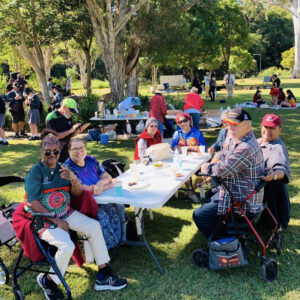A few weeks ago, we spoke with Cate and Sharon about their work with the local Noonga Reconciliation Group, their Reconciliation Action Plan and the work they have done around yarning and the upcoming referendum.
Sharon is the Coordinator of Northside Connect which includes Nundah Neighbourhood Centre. Cate is from Community Living Association, which is located just a block from the Nundah Neighbourhood Centre and both organisations have a long history of working collaboratively. Most recently both organisations supported Noonga Reconciliation Group in the planning and running of their Sorry Day 2023 event. Both Cate and Sharon are on the Management Committee of Noonga Reconciliation Group.
Cate and Sharon both highlighted how building relationships with the whole community is a process that takes time, consideration and heart.
The team at Nundah first began by exploring the relationships they wished to nurture in the community and considered the best way to move forward.
“[We asked ourselves] what are the key relationships we need to be putting more time and work into? What are the key local networks? And it always came back Noonga.”
“[We then considered] How can we support instead of just steam rolling or starting something ourselves? How can we support this people’s organisation to actually achieve what they need to do?”
The Noonga Reconciliation Group was formed in 1997 and is a volunteer organisation made up of community members from the North Brisbane area. Noonga work with local Elders, schools and the broader community to create opportunities for cultural learning and reconciliation, organise events and raise awareness about issues impacting First Nations Peoples in the community.
Cate and the CLA’s approach for working with Noonga began by offering free, practical resources and spaces for the group to use with Northside Connect supporting this effort. Over time the team realised their skillset as developmental workers, communicators and project managers which prompted them to become more engaged in supporting the community while slowly introducing new people and volunteers to support their work.
“Slowly, slowly and gently, gently we worked on building trust and confidence that things will get done, that we could provide that support.”
Both Cate and Sharon highlighted the importance of coming together in conversation and using yarning circles to discuss often challenging topics in the community.
“The first thing that comes to mind is the value of coming together, to be able to talk things out. There isn’t this campaign, and it isn’t conversion, this is a space of sitting with community. When you acknowledge that there is diversity and division, you first have to think, how do we come together around this issue?”
“You share cups of tea, or you come together to eat something. You join in a safe way where you put you weapons down and sit by the fire and [engage] in all of those things. We’ve learned so much from the practices of First Nations People.”
Cate described how the yarning circles suited the work of their Centre and community, rather than using more formal and rigid methods of community consultation such as expert panels.
“We have things like pots of lemon myrtle tea, these and other little things help people to see that having shared history and engaging in truth telling enriches our life. We get a full story of where we’ve been and where we’re headed.”
Cate also discussed the importance of having a plan and engaging in conversations with her team before having their first yarning circle.
“We had lots of talks leading up to the first yarn, about whether or not we were going to take a position [on the Voice to Parliament]. We thought no, we’re not here to take a position, we’re just here to give information and give people opportunity to answer questions and be curious. We got really great feedback on the first yarn because we kind of just let it happen, we didn’t go in with a really strict plan. About 30 people came along and we just kept stretching our circle out bigger.”
Noonga Reconciliation group have expanded already and are hosting a yarning circle at the local library. They plan to have yarning circles at a few different Neighbourhood Centres in the area, an effort that Northside connect is helping to support.
“The idea is to come alongside other Neighbourhood Centres instead of just holding our own conversations. We’d like to advertise to the wider community, so we aren’t just holding conversations with the already converted.”
Sharon emphasised the importance of connecting with First Nations People and the broader community thoughtfully. She highlighted how developing their Reconciliation Action Plan was a key component to the beginning of their journey.
“Doing a Reconciliation Action Plan was incredibly helpful for us as an organisation. It was one of the best things we did as part of our strategic planning because it allowed us to really stop and think about who the leaders are in our community, the groups of people we should be connecting with either on an individual basis, as a group or organisationally.”
“It helped us to identify who the leaders and key players were and then think about what our capacities are as a Neighbourhood Centre to truly engage and what we are looking to get out of this relationship.”
Sharon and Cate spoke highly of the volunteers involved with Noonga. Noonga is a 100% volunteer-led group and has had an incredible number of committed volunteers throughout its years. As an external organisation, supporting a volunteer people’s organisation, Cate highlighted the importance of keeping Noonga’s vision and agenda at the centre and supporting that through skills and resources.
Sharon and Cate continually emphasised the importance of moving slowly and thoughtfully in order to build deep and lasting relationships. Their Centre has done remarkable work bringing community together and we are grateful for them taking the time to share their approaches and philosophies with us.
Written By: Taylor Bast
Published: July 2023
